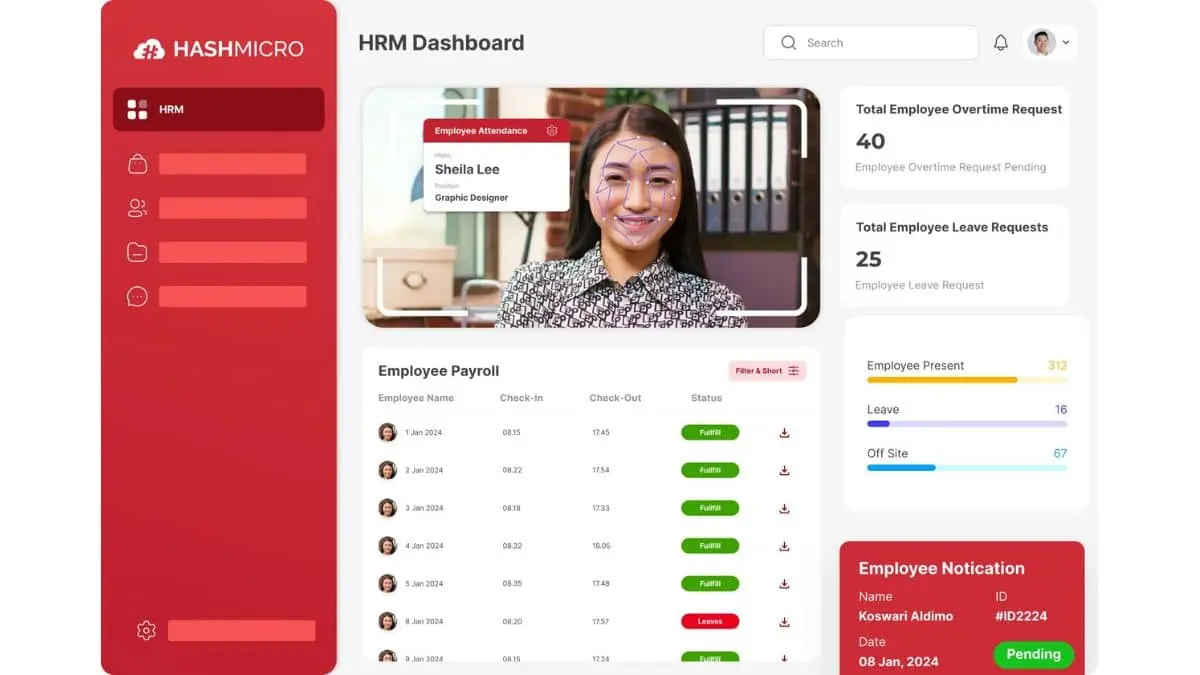Managing holiday pay can feel like a tightrope, especially when ensuring accuracy amidst evolving regulations. For managers, balancing compliance with fair compensation is both crucial and challenging.
Errors in holiday pay calculations, confusion over exemptions, and compliance with labour laws are common concerns for managers. Ang mga isyung ito ay maaaring magdulot ng parusa at makaapekto sa tiwala at kasiyahan ng mga empleyado.
According to the DOLE-BWC Handbook on Workers’ Statutory Monetary Benefits, employees must receive fair holiday pay, yet many businesses struggle to comply due to manual processes. Such challenges underline the importance of streamlined holiday pay management.
This guide provides an in-depth look at holiday pay in the Philippines, including common pitfalls and solutions. Discover how HashMicro’s HRM software can simplify compliance and improve efficiency.
Table of Contents

Key Takeaways
|
What is Holiday Pay?
Holiday pay is a form of compensation for employees during regular holidays, ensuring they are financially supported even during non-working days. In the Philippines, holiday pay is a legislated benefit requiring employers to pay employees their regular daily wage or an enhanced rate if work is performed on a holiday.
Employees who do not work on a regular holiday are entitled to 100% of their daily wage. However, if they work during the holiday, they receive their regular daily wage plus an additional 100% holiday pay, effectively doubling their earnings. On rare occasions, like double holidays, employees earn 200% holiday pay plus their daily wage, providing significant financial benefits.
This benefit safeguards employees from income loss during holidays and promotes their participation in national celebrations of historical and cultural importance. Rooted in the Philippines Labour Code, holiday pay exemplifies the State’s commitment to labour protection. At the same time, ensuring employees enjoy equitable compensation, which can be efficiently managed using HRIS software Philippines solutions.
Is Holiday Pay Required by Law?
In the Philippines, holiday pay is a required benefit established by law to ensure workers are fairly compensated during regular holidays. This obligation is based on Article 94 of the Labor Code (P.D. 442) and Section 3, Rule IV, Book Three of the Omnibus Rules, which specify employees’ entitlement to holiday pay.
These laws mandate employers to pay holiday benefits regardless of whether employees work on the holiday. Employees who do not work receive 100% of their daily wage, while those who work are entitled to their daily wage plus an additional 100%, rewarding their effort with higher pay.
PEZA accreditation requires compliance with local labor laws, including properly implementing holiday pay, for businesses operating within special economic zones. This ensures accredited companies uphold fair labor practices while enjoying investment incentives.
This legal framework highlights the government’s dedication to protecting labor rights, promoting fairness in compensation, and allowing workers to join national celebrations. It establishes a clear and equitable system for both employers and employees.
Computing the Holiday Pay in the Philippines
Understanding how holiday pay is computed ensures employees receive the correct compensation for regular and double holidays. Whether work is performed or not, covered employees are entitled to benefits based on clear formulas under Philippine labor laws.
Employees who do not work on a regular holiday are entitled to 100% of their daily wage as holiday pay. For instance, if the daily rate is Php1,000.00, the computation would be Php1,000.00 + Php0.00 = Php1,000.00. This ensures employees are paid fairly, even on non-working holidays.
If work is performed on a regular holiday, the employee is entitled to their daily wage plus 100% holiday pay. For example, if the daily rate is Php1,000.00, the total pay would be Php1,000.00 + Php1,000.00 = Php2,000.00, providing additional compensation for working on a holiday.
In cases of a double regular holiday, the entitlement increases significantly. If no work is performed, the employee receives 200% of their daily wage, or Php1,000.00 × 2 = Php2,000.00. This highlights the value of double holidays and ensures workers are properly compensated in these rare situations.
Discover how an HRIS can simplify holiday pay calculations and ensure compliance with labor laws. Click the banner below to get a tailored pricing estimate for our software and experience seamless payroll management today!

Who Qualifies for Holiday Pay?
Understanding who qualifies for holiday pay in the Philippines is essential to ensure compliance with labor laws, fairness for workers, and effective HCM (Human Capital Management). While holiday pay is a mandated benefit for most employees, certain groups are explicitly exempt due to the nature of their work or employment arrangement.
These exemptions are clearly outlined in Philippine labor regulations and consider factors like job responsibilities, employment structure, and operational challenges. Below, we’ll discuss which employees are covered and who are excluded:
1. Government employees
Government employees, including those working for the National Government, local government units, and government-owned corporations with original charters, are not entitled to holiday pay.
This exclusion is outlined in Section 2, Rule I, Book III of the Omnibus Rules. Since these employees often follow different compensation structures, holiday pay is not part of their statutory benefits. As a result, their compensation for holidays is governed by separate policies unique to government service.
2. Retail and service employees
Employees of small retail and service establishments employing no more than five workers are not eligible for holiday pay. This rule applies to small shops or local service providers with limited workforce.
The exclusion recognizes micro-businesses operational constraints in meeting holiday pay’s financial obligations. However, larger retail and service establishments must comply with employee holiday pay requirements.
3. Kasambahay and persons in the personal service of another
Kasambahay, or domestic workers, who perform household tasks like cleaning, cooking, or childcare, are not entitled to holiday pay. Similarly, individuals providing personal services, such as chauffeurs or family assistants, are also excluded.
These roles are governed by specific labor laws, such as the Kasambahay Law, which includes provisions tailored to their employment nature. While holiday pay may not apply, employers are encouraged to provide fair compensation and benefits to these workers.
4. Managerial employees and managerial staff
Managerial employees are excluded from holiday pay if they primarily manage a department, supervise others, and have authority over employment decisions. Similarly, officers or managerial staff members performing policy-related tasks and exercising discretion are exempted.
The title of “manager” alone is not enough; they must meet specific criteria under labor laws to qualify for the exemption. Employees misclassified as managerial, such as “managers in name only,” are entitled to holiday pay if they do not meet the required conditions.
5. Field personnel and workers are paid on a task or contract basis
Field personnel who work away from their employer’s premises and whose hours cannot be reasonably monitored are not entitled to holiday pay. This also includes workers paid on a task or contract basis if they qualify as field personnel under labor laws.
However, workers on task-based pay without the field personnel classification remain entitled to holiday pay. This distinction ensures fairness while acknowledging the unique nature of field-based work arrangements.
Optimize your Holiday Pay Calculations Effortlessly with HashMicro’s HRM Software
HashMicro’s HRM Software is a powerful tool that simplifies holiday pay management for businesses. Automated calculations, accurate employee data tracking, and customizable settings ensure compliance with labor laws while reducing the risk of errors in holiday pay processing.
Experience the capabilities of HashMicro’s HRM Software through a free demo and discover its innovative features firsthand. From automated pay computations to comprehensive compliance tracking, this software is designed to optimize holiday pay management and streamline HR processes.
Why choose HashMicro? This software automates crucial tasks such as holiday pay computation, employee scheduling, and recordkeeping, saving time while minimizing compliance risks. Its customizable features allow businesses to adapt pay structures to specific needs, ensuring fairness and accuracy for all employees.
Key features of HashMicro’s HRM Software include:
1. Fully Localized Payroll with Tax Calculation: Simplify payroll processing with accurate tax calculations tailored to local labor laws and regulations. This feature ensures compliance and eliminates errors in tax deductions and salary computations.
2. Daily Worker and Hourly Worker Payslip Management: Generate precise payslips for daily and hourly workers with automated calculations for their specific pay structures. This feature reduces manual work and guarantees fair compensation.
3. Complete Overtime Management Linked with Attendance and Payroll: Automate overtime pay based on real-time attendance management system seamlessly integrated with payroll software. This ensures employees are fairly compensated for their extra hours without delays.
4. Built-in Professional Templates for Payslips: Access customizable, professional payslip templates to standardize payroll documentation. These templates enhance efficiency and ensure a polished, consistent format for all payslips.
5. In-depth Payroll Reporting: Gain actionable insights through detailed payroll reports covering salaries, taxes, and deductions. These reports help businesses make informed financial decisions and maintain transparency.
6. Integrations with Biometrics and Attendance Devices: Sync payroll directly with biometrics and attendance systems for accurate salary computation. This integration eliminates manual data entry and ensures error-free payroll processing.
7. Mobile App for Employee Self-Service: Empower employees with mobile access to their payslips, tax details, and salary breakdowns anytime, anywhere. This feature boosts transparency and reduces HR workload through self-service options.
8. Approval Delegation with Auto Follow-Up Notifications: Streamline payroll approvals with delegated tasks and automated reminders for faster processing. This ensures timely payroll management and reduces administrative delays.
9. In-depth Leave Management Linked with Payroll: Automatically adjust payroll for leave balances, carryovers, and expirations. This integration ensures accurate salary calculations and compliance with leave policies.
Beyond its efficiency, the software offers unlimited user access, seamless third-party integrations, and scalable modules to meet the growing needs of your business. HashMicro’s HRM Software is the ultimate solution for businesses aiming to simplify holiday pay management while enhancing compliance and operational efficiency.
Conclusion
Holiday pay in the Philippines ensures employees are fairly compensated during regular and special holidays, aligning with labor laws. Managing holiday pay effectively can be complex, but leveraging HRIS software simplifies calculations, ensures compliance, and reduces administrative effort.
HashMicro’s HRM Software is the ultimate solution for businesses seeking efficient holiday pay management. With features like automated payroll calculations, real-time attendance integration, and compliance tracking, it eliminates errors and saves valuable time for HR teams.
Experience the benefits firsthand with a free demo of HashMicro’s HRM Software. Discover how this innovative tool can optimize holiday pay processes and transform your overall HR management system.
























